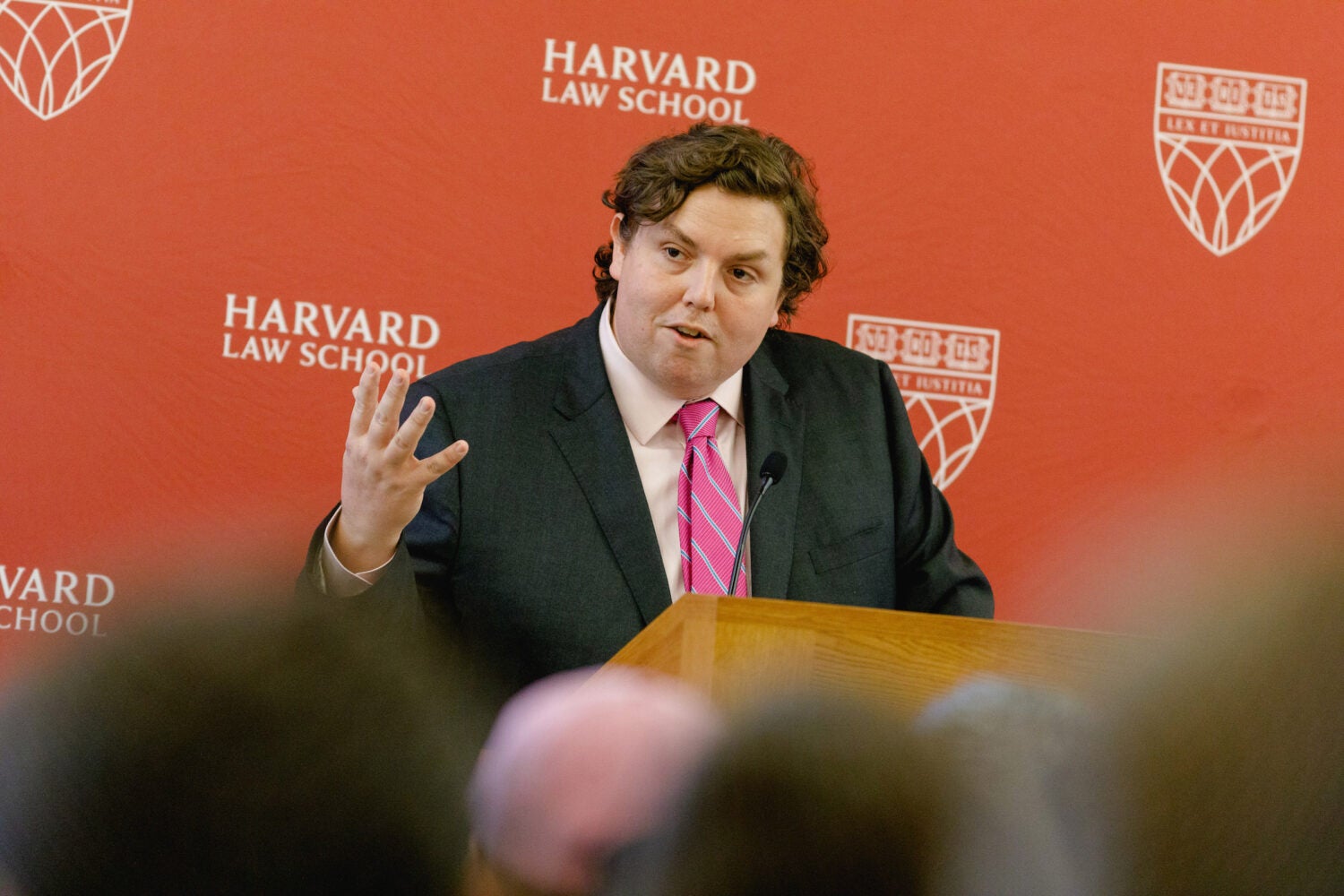Textualism must recognize the existence and relevance of unwritten law, argued William Baude, a professor of law at the University of Chicago Law School, during Harvard Law School’s Scalia Lecture this week. In fact, he said, the use of such law may be required in some situations.
“If we think of textualism and the phrase ‘the plain text’ as just mantras, prayers to ward off the demons of bad judging, we will not find salvation,” said Baude. “We need to understand why textualism was right. And if we do, then it may mean that sometimes, in some cases, our analysis will have to move a little bit beyond the text.”
Baude began his talk by asserting that textualism, or the method of legal interpretation that emphasizes the plain language of a statute, “has won… and we have Justice Scalia to thank for that.”
“The kinds of open and notorious anti-textualist opinions … A lot of them are now almost unthinkable today,” he continued, pointing to examples such as the 1978 Supreme Court decision in Tennessee Valley Authority v. Hill and “its 20 pages of unnecessary legislative history to make the obvious point of what the statute said.”
Key to understanding textualism are two theoretical models, positivism and formalism, said Baude. Positivism is the idea that judges are supposed to “follow external sources of law,” rather than using their own discretion in decision-making, while formalism recognizes that “the rule does not always match the reasons for the rule.”
Despite these elements, Baude insisted that textualism is “missing something.” The problem, he said, is that the text itself is often incomplete. “It gives incomplete or misleading answers to important questions about the law and so it needs to be supplemented with attention to our entire legal framework,” he said. “Because our legal system relies not just on written texts, but also an unwritten law, we need to supplement textualism with this unwritten law — law that governs both interpretation and background principles against which interpretation takes place.”
“We need to understand why textualism was right. And if we do, then it may mean that sometimes, in some cases, our analysis will have to move a little bit beyond the text.”
It is possible to interpret a law incorrectly if one assumes that every choice was made deliberately when writing it, he said. Instead, we should “recognize that sometimes the legislature’s choice was just to stop making any decisions in the text either way and leave remaining questions up to the law that came before, whatever that was, whether it was written or unwritten.”
Historically, the founders’ view was that “that law could be, that law was supposed to be, found, not made,” said Baude. This unwritten law might include customs, or it “might be found in first principles that were customary only in some baser sense. But it involves the same underlying jurisprudential insight behind textualism: the judge is supposed to enforce rules that were made someplace else, not to make the rules herself or to imagine decisions that were never actually made by anybody.”
As an example, Baude pointed to Section 1 of the 14th Amendment, known as the Privileges or Immunities Clause. To the Republican members of the Civil War-era Congress who wrote it, he said, general law had already supplied the amendment’s underlying rights. “That is why the 14th amendment was not thought to confer new rights to citizenship, it was to secure the preexisting rights. Rights that were already thought to circumscribe state power, but by shifting their enforcement to federal courts, and to Congress from state courts and legislatures.”
This method of moving beyond textualism can actually help us remain more faithful to the text, he said. In the case of the 14th Amendment, this approach could “help us figure out the unenumerated rights that the 14th Amendment is supposed to protect, without necessarily opening Pandora’s box to judges being able to decide” to confer any rights they so choose under the amendment.
In closing, Baude argued that our system needs unwritten law, “because our legal texts sometimes point us toward it, and we need to know how to accept the invitation.”
There are dangers in admitting this, he said, before adding that there may be more danger in not doing so. “It risks leading us to close our eyes to the meaning of the constitutional text itself, because sometimes the text requires us to engage with unwritten law to go beyond the text.”
Baude ended his lecture with a plea: “If we do not teach our students how to do these things, if we do not revive the more fundamental pre-realist tenets of our legal tradition, then our students will be misled into thinking that the only choices are the plain text and judicial policymaking.”
Want to stay up to date with Harvard Law Today? Sign up for our weekly newsletter.
